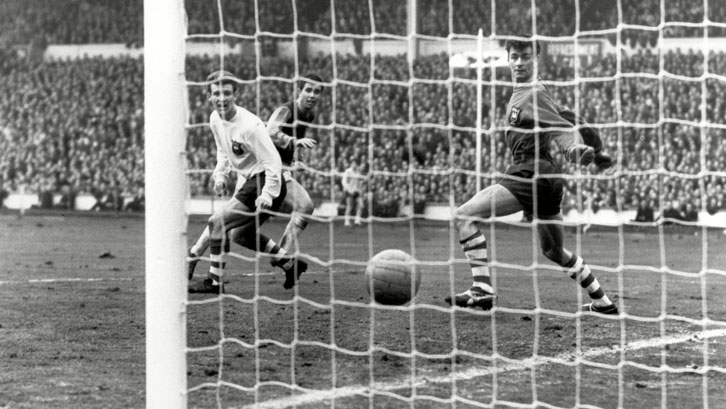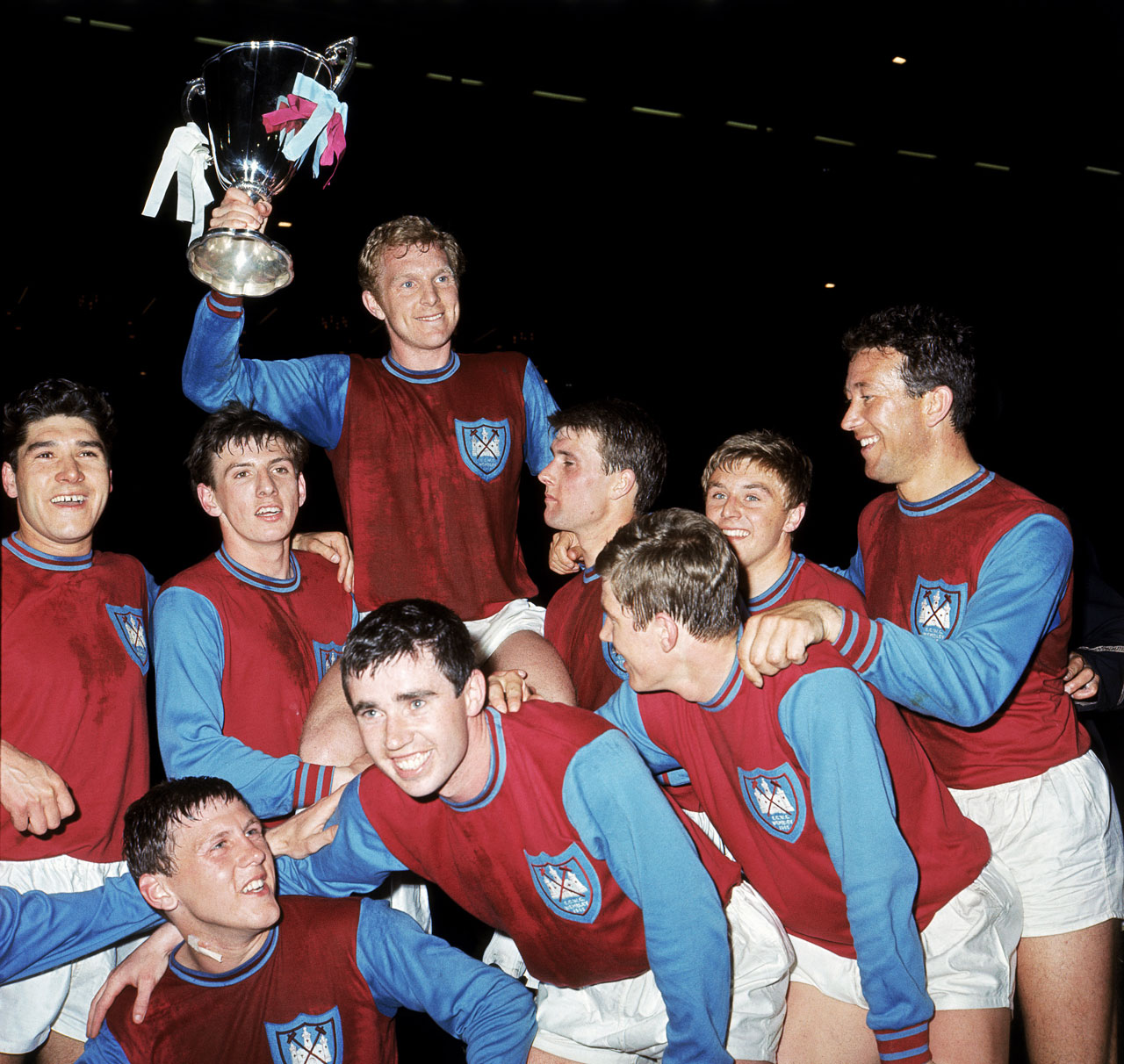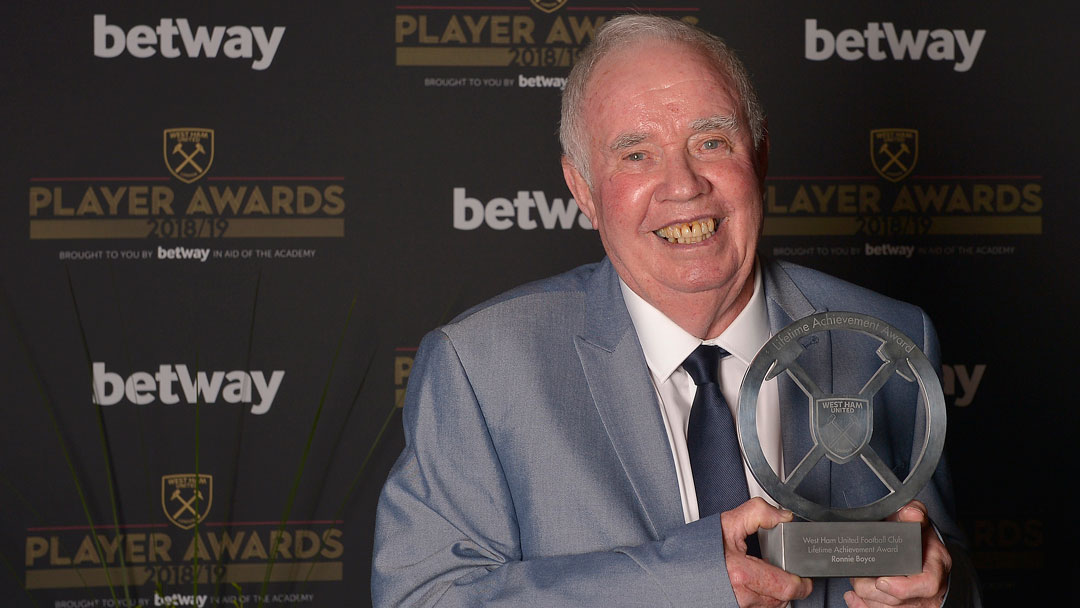Everyone at West Ham United has been left deeply saddened by the passing Hammers legend Ronnie Boyce at the age of 82.
A true Claret and Blue giant, East Ham-born Boyce joined the Club as a teenager, debuted at 17, scored the goals which took West Ham to the 1964 FA Cup final and headed the winning goal in the final at Wembley Stadium at 21, and won the European Cup Winners’ Cup at 22.
Nicknamed ‘Ticker’ for his tireless midfield play, Boyce made a total of 341 appearances for the Club, scoring 29 goals, before retiring in 1972.
He became a key member of manager John Lyall’s coaching staff, helping the Hammers win two further FA Cups in 1975 and 1980, and later served as both caretaker manager and chief scout, before retiring in 1995.
A hugely popular figure, Boyce’s incredible contribution to West Ham United was recognised with the Club’s Lifetime Achievement Award in 2019.

Born just a short distance from the Boleyn Ground in East Ham in January 1943, Boyce played schoolboy football for England before joining West Ham as a schoolboy. He made his first-team debut in October 1959 in a Southern Floodlight Cup win over Millwall, when he was just 16 years and nine months old.
At 17, he made his Football League debut in October 1960 in a 5-2 First Division win over Preston North End – the same opponents who would see their FA Cup dreams dashed by Boyce three-and-a-half years later.
In between, Boyce established himself in Ron Greenwood’s team in late 1962, while still a teenager, and caught the eye with his peerless work-rate and knack of scoring important goals.
“We called Ronnie ‘Ticker’ because when he was ticking over well the whole team seemed to play well,” recalled Lyall. “He was a superb interceptor and a good and intelligent passer of the ball. As a player, he epitomised all the good things Ron Greenwood stood for as a manager.”

After becoming a first-team regular in 1962/63, Boyce played an amazing 55 matches the following season, climaxing with two goals in the famous FA Cup semi-final win over Manchester United at a rain-soaked Hillsborough, and his perfectly timed headed winner against Preston at Wembley in May 1964.
Boyce played another 54 games the next season and was back at the Home of Football in May 1965, when his interception led to Alan Sealey’s opening goal in the 2-0 European Cup Winners’ Cup final victory over TSV 1860 Munich.
A member of the greatest West Ham team of them all alongside his close friends Bobby Moore, Geoff Hurst, Martin Peters, Ken Brown and schoolboy pal Brian Dear, Boyce was an integral part of Greenwood’s side for the remainder of the decade, while helping to develop the young Billy Bonds and Trevor Brooking.
By the time Boyce hung up his boots in 1972, he had played 341 times in Claret and Blue, and scored 29 goals. In November of the same year, he was awarded a Testimonial, which saw the Hammers beat a Manchester United team including George Best and Bobby Charlton 5-2 at the Boleyn Ground.
He then joined the Club’s coaching staff, helping the Hammers win two further FA Cups in 1975 and 1980, and helping the Academy of Football’s youngsters reach the FA Youth Cup final in 1975.
As a universally trusted and experienced presence, Boyce later served as both caretaker manager and chief scout, before retiring in 1995.

Boyce and his family relocated to Norfolk, where he lived happily with his wife Dawn and sons Gary and Tony, and he continued to follow the fortunes of the Club he loved from afar.
In 2016, he was at the Boleyn Ground as West Ham bid farewell to the stadium he called home for decades, cheering his Hammers to a thrilling victory over Manchester United.
He fittingly attended the UEFA Europa League win over Rapid Vienna in September 2021, before which a statue paying tribute to the 1965 European Cup Winners’ Cup success was unveiled outside London Stadium.
His final visit to London Stadium was in May 2024, when he joined his former teammates as part of the Club’s celebrations to mark the 60th anniversary of the historic 1964 FA Cup triumph.
The trademark smile that had spread across his face at Wembley all those decades previously was there again as he was reunited with fellow heroes Hurst, Ken Brown, Eddie Bovington and Jack Burkett and enjoyed a video call with John Sissons and Jim Standen.
The thoughts of everyone at West Ham United are with Ronnie’s family, friends, teammates and all who had the good fortune of knowing a true Hammers great at this very sad time.
